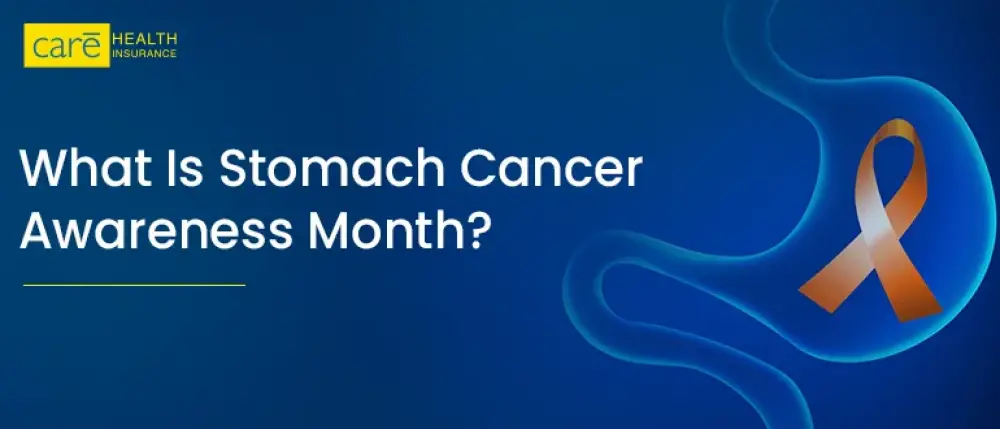Subscribe to get weekly insights
Always stay up to date with our newest articles sent direct to your inbox
Published on 13 Nov, 2024
Updated on 27 Mar, 2025
252 Views
4 min Read

Written by Rashmi Rai
favorite0Like
favoriteBe the First to Like
Stomach Cancer Awareness Month is a global healthcare event that has been observed for the past 12 years. Being organised in the month of November, it shines a spotlight on one of the most overlooked cancers worldwide. This month is dedicated to increasing awareness, encouraging early detection, and supporting vital research. Join a global movement to better understand stomach cancer, spread hope, and empower those affected through knowledge and advocacy.
Stomach Cancer Awareness Month is crucial for raising awareness about stomach cancer. This month encourages education on recognising symptoms, understanding risk factors, and highlighting the importance of screening for those at higher risk. By spreading awareness, we can improve early detection rates, support research funding, and foster a supportive community for patients and families affected by the disease.
Stomach Cancer Awareness Month was established by advocacy organisations. These organisations aimed to bring more public attention to the lack of awareness around this type of cancer, which contributes to its high mortality rate. Over the years, Stomach Cancer Awareness Month has gained international recognition, uniting communities worldwide to address the prevention, research, and treatment needed to combat stomach cancer, also known as gastric cancer. Its significance lies in empowering individuals to learn, support, and take action against this often-overlooked disease.
Stomach Cancer Awareness Month offers numerous ways for people to get involved, spread knowledge, and support those affected. These activities collectively help increase awareness, foster community support, and promote early detection efforts that can make a life-saving difference.
Stomach cancer symptoms can often be subtle and mistaken for common digestive issues. These symptoms can appear in other, less serious conditions, so it is important to consult a doctor for proper evaluation, especially if symptoms persist.
Understanding the risk factors for Stomach Cancer can help in taking preventive steps before the medical condition worsens.
Stomach Cancer treatment depends on the stage of cancer, the patient’s overall medical health, and other individual factors. Here are standard and advanced treatment options available for Stomach Cancer:
Stomach cancer prevention focuses on reducing risk factors and promoting a healthy lifestyle. By following these preventive methods, individuals can significantly lower their chances of developing gastric cancer.
Stomach Cancer Awareness Month is a vital time to increase understanding, promote early detection, and support those affected by this often-overlooked disease. By raising awareness, we can encourage healthier lifestyles, advocate for more research, and help improve survival rates.
The standard cancer treatment is usually expensive and could burn a hole in your pocket. It is always advised to get health insurance with a cancer cover policy to have strong financial support in times of need.
Let’s unite this November to spread knowledge and make a meaningful impact in the fight against stomach cancer.
>> Also Read: Cervical Cancer Symptoms, Diagnosis and Treatment
Disclaimer: The above-mentioned information is for reference purposes only. Kindly refer to the official sources for the latest updates on the facts and information provided. Plan features and claims underwriting are subject to policy terms and conditions.
favoriteBe the First to Like
शुगर कंट्रोल कैसे करे? जानें, डायबिटीज में क्या खाना चाहिए Care Health Insurance in Health & Wellness
Thyroid : मामूली नहीं हैं महिलाओं में थायराइड होना, जानें इसके लक्षण और घरेलू उपचार Care Health Insurance in Diseases
हाई ब्लड प्रेशर को तुरंत कंट्रोल कैसे करें? देखें इसके उपाय Care Health Insurance in Diseases
प्लेटलेट्स की कमी के लक्षण, कारण और इलाज क्या है Care Health Insurance in Diseases
World Chagas Disease Day: Understanding Global Health Impact of Kissing Bugs Care Health Insurance in Awareness Days
World Parkinson’s Day: Raising Hope for the Elderly Care Health Insurance in Awareness Days
World Bipolar Day 2025: Understanding Bipolar Disorder and Breaking Stigma Care Health Insurance in Health Insurance Articles
ट्यूबरक्लोसिस (टीबी) के लक्षण, कारण और इलाज Care Health Insurance in Awareness Days